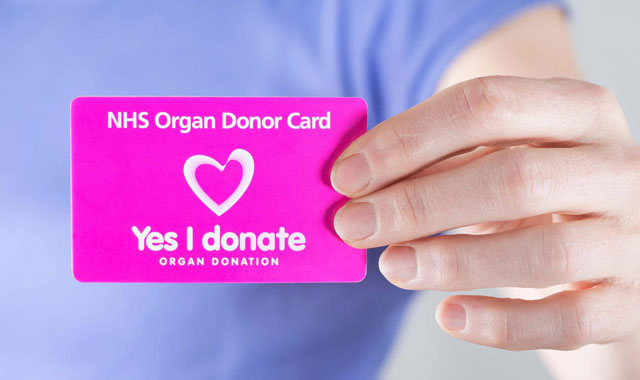This guide answers many questions about donating organs. Let’s never forget that organ donors save lives. One thing that is often overlooked is that organ donors have typically died in a hospital intensive care unit or emergency department and that 99% of people do not die in circumstances that make it possible for them to donate their organs.
This guide explores the issues if you were able to donate your organs.

Which organs can be donated?
When you register a decision to donate, you will be asked whether you want to donate some or all of your organs when you die. You can choose to donate your heart, lungs, kidneys, liver, corneas, pancreas and small bowel. You also have the opportunity to donate tissue. This information will be available to specialist nurses when your record is reviewed and your decision around donating specific organs and tissue will always be respected.
Let’s never forget that organ donors save lives.
Organ Donation Procedure
The organ donation process involves a specialist team who ensure that donors are treated with great care and respect during the removal of organs and/or tissue for donation. The retrieval of organs takes place in a normal operating theatre under sterile conditions, and is carried out by specialist surgeons. Afterwards the surgical incision is carefully closed and covered by a dressing in the normal way. Only those organs and tissue specified by the donor and agreed with the family will be removed.
End of Life Discussions
There are strict criteria in place in the UK to help those caring for the dying, by providing safe, timely and consistent criteria for the diagnosis of death. Organs are never removed until a patient’s death has been confirmed in line with these criteria.
Healthcare professionals also have a duty of care to save a person’s life first and foremost and only if, despite the best efforts of healthcare professionals, death is inevitable, is organ and tissue donation considered as part of the end of life care discussions that may be held with a person’s family, friends and next of kin. At this time the NHS Organ Donor Register is accessed by a specialist nurse and the possibility of organ donation is considered and discussed with the family.
Death is confirmed by doctors who are entirely independent of the transplant team and this is done in the same way for people who donate organs as for those who do not.
Funeral Considerations
Funeral arrangements are generally not affected by organ donation. Your family are always consulted to see if there are considerations around faith, beliefs or culture with respect to funeral arrangements. The donation operation is performed as soon as possible after death and after the operation, the body is returned to the family of the deceased in the same way as any death in a hospital. Families are given the opportunity to spend time with their loved one after the operation if they wish. Organ and tissue donation doesn’t prevent having an open-casket funeral. The body is clothed ready for burial, so there are no visible signs of organ or tissue donation.
Religious Considerations
All major religions in the UK are open to the principles of organ donation and transplantation and accept that organ donation is the choice of an individual.
When you register as an organ donor on the NHS Organ Donor Register, you have the opportunity to say whether or not you would like the NHS to speak to your family, and anyone else appropriate, about how organ donation can go ahead in line with your faith or belief system.
The “opt-out” system
In an “opt-out” system, if there is no recorded decision for you, it will be considered that you agree to donate your organs after death unless you are in an excluded group, or you have let your friends or family know you do not wish to donate any organs, and they pass this on to the team involved in your end of life discussions.
The “opt-out” system presumes consent to organ donation unless otherwise specified so if you don’t want to donate, then you must record your decision on the NHS Organ Donor Register. Within an “opt-out” system the decision about whether or not to choose to donate your organs is up to the individual which will be respected in the event of your death.
The donor card
Carrying an organ donor card is a valid form of consent but it is possible that your donor card might not always available to specialist nurses. For this reason, we would always recommend that you register your decision on the NHS Organ Donor Register and share this decision with your family. A donor card can be picked up from a doctors or pharmacy.

The family’s role in organ donation
Families are always consulted prior to donation for a number of reasons, including consideration as they are facing the loss of someone close to them and information the family may have about donation that is more recent than the decision recorded on the NHS Organ Donor Register.
The information that families provide before organ donation goes ahead, together with medical tests, is vital to understanding whether the person’s organs are safe to transplant into somebody else.
Organ donation can only go ahead the donor’s consent and/or the support of their family. The best way to make sure the right course of action is followed is to register it on the NHS Organ Donor Register and tell your family, or a loved one. By telling your family what you’ve decided, you can relieve them of the burden of having to make a difficult decision at such a stressful time.
What if the family object to organ donation?
If your family, or those closest to you, object to donation even when you have given your permission (either by telling relatives, friends or clinical staff, by joining the NHS Organ Donor Register or by carrying a donor card) healthcare professionals will discuss the matter sensitively with them.
They will be encouraged to accept your decision and it will be made clear that they do not have the legal right to veto or overrule your decision. There may, nevertheless, be cases where it would be inappropriate for donation to go ahead if donation would cause distress to your family.
What if there is no family?
If no family members are available, a friend of long standing can be consulted. The Human Tissue Authority have set out Codes of Practice, which include a list of those who should be approached about organ donation. This starts with your family, then includes friends and care workers who will have known you and may be able to speak for you. Organ donation would not go ahead if the NHS cannot contact someone who knew you well, even if you have registered a decision to donate on the NHS Organ Donor Register. The NHS has a duty to consider the safety of any organs for transplant. This is why speaking to the family, or someone else appropriate, about medical and lifestyle history is so important.
Children and consent
If someone under the age of 18 dies in England, their parents would normally be approached about organ donation and given the opportunity to consent on their child’s behalf. Organ donation would only go ahead with the agreement of the family.
The deemed consent, or ‘opt out’ system in England does not apply to children. If there was a decision recorded on the NHS Organ Donor Register, this information would be shared with the family.
Medical research
You can donate some organs and tissues for research purposes if other organs and tissues are taken for transplantation. Your organs and tissue can only be used for research after you die if they are not suitable for transplant. Donating organs for medical research is not part of the deemed consent or opt out system for organ donation in England.
Also, donating your whole body for medical research is not part of the deemed consent or opt out system for organ donation in England.
Whole bodies are not accepted for teaching purposes if organs have been donated or if there has been a post-mortem examination. Your body may be used for anatomical examination, teaching and research. The best and most useful way to do this is to specify a teaching hospital in your will, so that your executors can contact the right people immediately after your death.
Organ donation wishes and Wills
People wanting to donate their organs can leave their wishes in a Will, and in recent years, there has been an increase in clients expressing organ donation wishes in their Wills.
Of course, the Will is most often read some time after a person has died so it is important that an individual’s preferences are discussed with their family whilst everyone is alive.
However, if you make it clear in your Will that you wish to give your body for teaching and research, or to donate organs, it is most likely that your executors will do their best to carry out your wish.
If you have found this useful, and want to donate your organs, now is a good time to write a new Will.